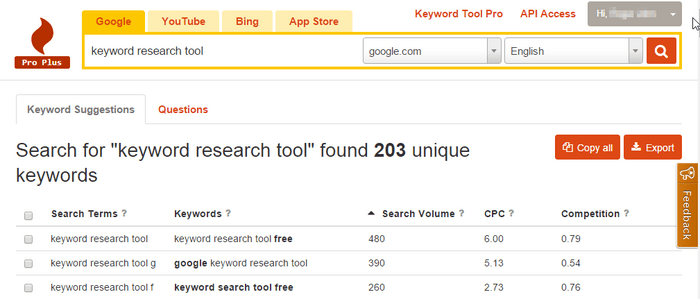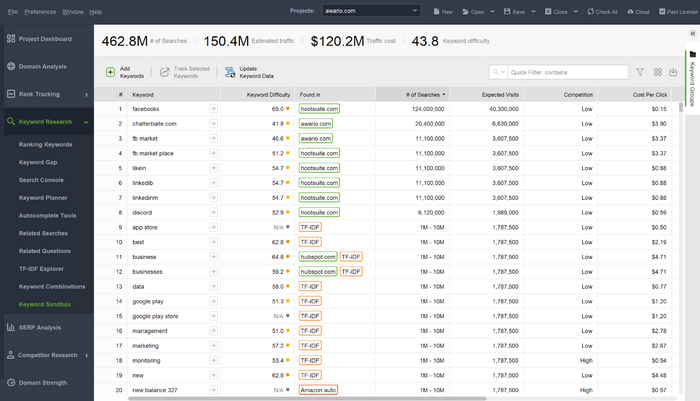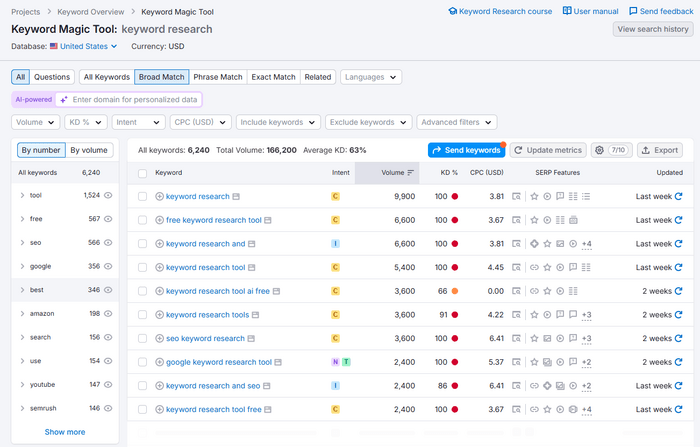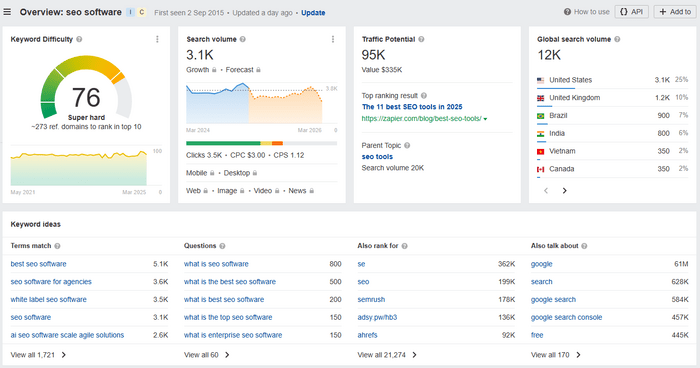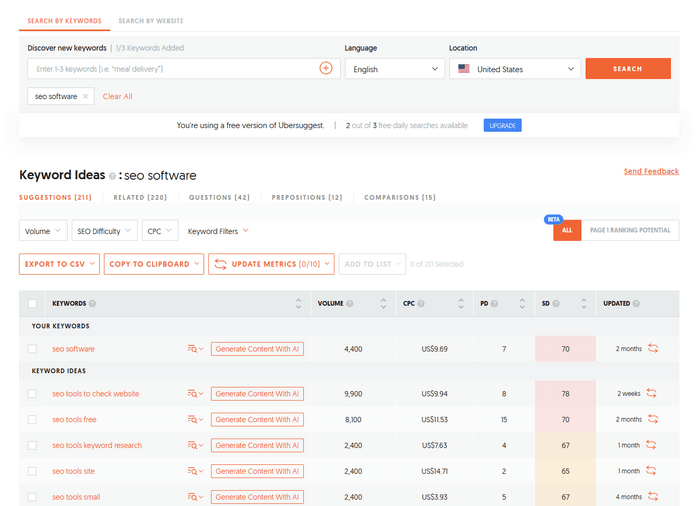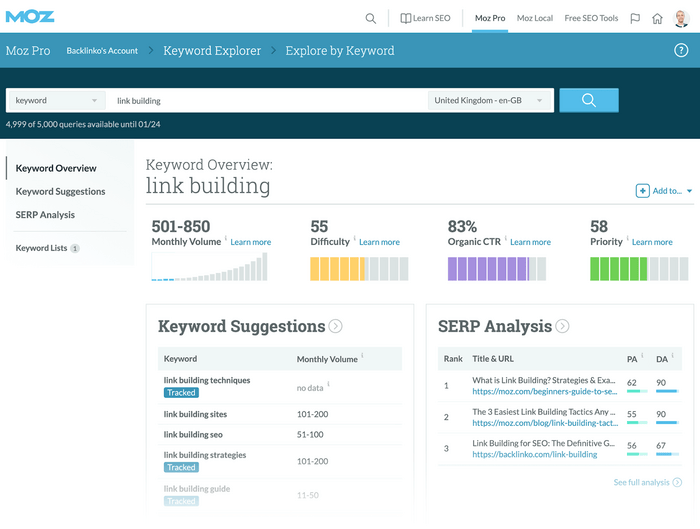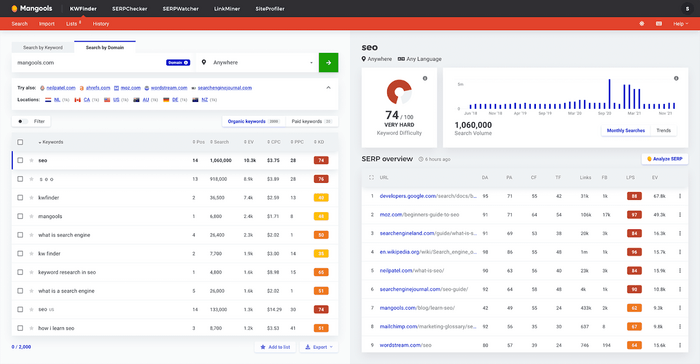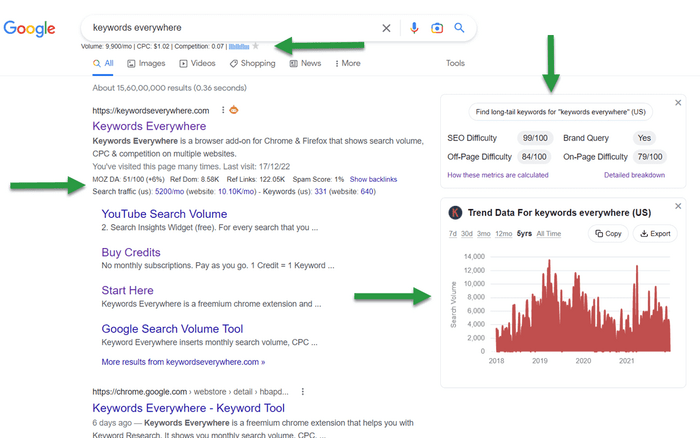8 Best KeywordTool.io Alternatives For 2025

Contents
- 1. RankDots: the AI-powered SEO assistant
- 2. SEO PowerSuite Rank Tracker: the budget-friendly keyword tool
- 3. Semrush: the all-in-one powerhouse
- 4. Ahrefs: the competitor crusher
- 5. Ubersuggest: the budget-friendly starter
- 6. Moz Keyword Explorer: the precision pick
- 7. KWFinder (Mangools): the long-tail king
- 8. Keywords Everywhere: the browser buddy
Keyword research is the backbone of any solid SEO strategy. Finding the right tool can feel like hunting for a golden ticket—except instead of chocolate, you’re after traffic, rankings, and conversions.
KeywordTool.io has been a go-to for many, scraping Google Autocomplete to churn out long-tail keywords fast. But let’s be real: it’s not perfect. Its free tier teases you with suggestions but hides key data like search volume, and the paid plans can sting for what you get. Plus, it lacks deep competitor analysis or SERP insights, leaving you guessing about rankability.
In 2025, the keyword game’s evolving. AI’s in the mix, SERP analysis is sharper, and SEOs and website owners need tools that don’t just spit out lists but help craft content that wins.
If you’re looking for an SEO tool that goes beyond just listing keywords and actually helps you rank, I’ve tested the best KeywordTool.io alternatives for 2025. Here’s a breakdown of the top tools based on pricing, features, and real-world value.
1. RankDots: the AI-powered SEO assistant
Best for: Bloggers, content marketers, and SEO freelancers who want fast keyword insights and AI-driven content.
Standout feature: AI-powered keyword grouping and content suggestions.
RankDots is built for speed and efficiency—you don’t just get keywords, you get ready-to-rank content ideas. Enter a seed keyword, and RankDots generates thousands of grouped keyword clusters, complete with search volume, difficulty, and intent-based insights. Need content? The AI engine drafts optimized outlines and article suggestions so you can start ranking faster. I tested it with “best SEO tools 2025” and discovered clusters like “SEO tools for small businesses” and “AI-driven SEO platforms”—highly relevant and low-competition.
Pros: AI-driven keyword clustering, fast content suggestions, affordable compared to SurferSEO.
Cons: Fewer backlink insights.
Why it beats KeywordTool.io: It’s not just keyword ideas—it’s an SEO workflow. RankDots helps you go from research to publishing without guesswork.
2. SEO PowerSuite Rank Tracker: the budget-friendly keyword tool
Best for: SEO pros and small businesses needing a desktop-based solution.
Price: Free version available; paid plans start at $299/year (one-time license with optional renewals).
Standout feature: Unlimited keyword tracking with no per-query fees.
SEO PowerSuite’s Rank Tracker is a powerhouse for those who prefer desktop software over cloud-based tools.
Unlike Semrush or Ahrefs, which charge per keyword or per report, Rank Tracker lets you track unlimited keywords for a flat fee. Plug in a seed keyword, and it pulls thousands of suggestions from Google Autocomplete, Google Ads, and even competitors' ranking data. I tested it with “best SEO tools 2025”—it surfaced long-tail gems like “SEO tools for small businesses” with moderate competition.
Pros: Powerful keyword tracking, dozens of keyword tools, competitor research, customizable reports.
Cons: Requires installation and a solid PC/laptop to run the checks.
Why it beats KeywordTool.io: It’s not just a keyword finder—it’s a full ranking analysis tool that monitors your SEO progress over time, something KeywordTool.io lacks.
3. Semrush: the all-in-one powerhouse
Best For: Marketers who want everything—keywords, competitors, and beyond.
Price: Starts at $139.95/month (14-day free trial with promo codes).
Standout Feature: Keyword Magic Tool.
Semrush is the Swiss Army knife of SEO. It’s not just about how to write an article—it’s about dominating the SERP. Enter a seed keyword, and the Keyword Magic Tool spits out thousands of ideas, complete with search volume, intent (informational, transactional, etc.), and difficulty scores. Where KeywordTool.io stops at suggestions, Semrush digs deeper with the Keyword Gap tool, showing what your rivals rank for that you don’t.
Pros: Massive 25 billion keyword database, competitor spying, backlink analysis, and content optimization.
Cons: Pricey for solo users, and the learning curve can intimidate newbies.
Why It Beats KeywordTool.io: You’re not just brainstorming—you’re strategizing with data KeywordTool.io can’t touch.
4. Ahrefs: the competitor crusher
Best For: Writers obsessed with outranking the competition.
Price: Starts at $129/month (no full free trial, but $7 for 7-day access).
Standout Feature: Keywords Explorer.
Ahrefs is a beast at uncovering what works. Its Keywords Explorer pulls keyword ideas with precise metrics—search volume, clicks, and a Keyword Difficulty (KD) score that many find reliable.
Plug in a competitor’s URL, and the Content Gap tool highlights keywords they rank for that you’re missing. I ran “SEO tools” and found “free SEO tools for small business” at 900 searches/month, KD 15—ripe for the taking.
Pros: Top-tier backlink data, SERP overview, and click tracking.
Cons: No PPC focus, and the price jumped recently, irking some users.
Why It Beats KeywordTool.io: It’s not just tips for writing articles—it’s a blueprint to steal your rivals’ traffic.
5. Ubersuggest: the budget-friendly starter
Best For: Beginners or small budgets.
Price: Free tier; paid starts at $12/month (lifetime option $120).
Standout Feature: Keyword Ideas Report.
Neil Patel’s Ubersuggest keeps it simple and cheap. Enter a keyword, get ideas with volume, CPC, and a basic difficulty score. I tested “blogging tips” and found “blogging tips for beginners” at 1,300 searches/month—doable for a new site. It’s not as deep as Semrush, but it’s a solid entry point for writing an article that ranks.
Pros: Free tier rocks, intuitive, lifetime deal option.
Cons: Data’s less accurate, limited features compared to big players.
Why It Beats KeywordTool.io: Free volume data out of the gate—no paywall tease.
6. Moz Keyword Explorer: the precision pick
Best For: Writers who value accuracy over flash.
Price: Starts at $99/month (10 free queries/month).
Standout Feature: Priority Score.
Moz balances usability and insight. Its Keyword Explorer scores keywords on difficulty, volume, and opportunity (click-through potential). I ran “SEO writing” and got “SEO writing tips” with a Priority Score of 72—high potential, manageable competition. It’s less overwhelming than Semrush but still packs a punch.
Pros: Clean interface, reliable data, free trial queries.
Cons: Smaller database, fewer extras like backlinks.
Why It Beats KeywordTool.io: Metrics you can trust, not just a suggestion dump.
7. KWFinder (Mangools): the long-tail king
Best For: Nailing low-competition long-tails.
Price: Starts at $29/month (10-day free trial).
Standout Feature: Keyword Difficulty Score.
KWFinder, part of Mangools’ suite, excels at finding long-tail keywords with low difficulty. I searched “how to write an article” and found “how to write an article for a magazine” at 300 searches/month, KD 22—perfect for a niche play. It’s simple, affordable, and pairs with SERP analysis tools in the bundle.
Pros: Budget-friendly, accurate KD, sleek design.
Cons: Limited daily searches, no competitor gap tool.
Why It Beats KeywordTool.io: Actionable difficulty scores, not just raw ideas.
8. Keywords Everywhere: the browser buddy
Best For: Quick, on-the-fly research.
Price: Credit-based, ~$1 for 10,000 credits (free browser extension).
Standout Feature: In-Browser Suggestions.
The Keyword Everywhere extension overlays keyword data on Google, YouTube, or Amazon as you search. Type “article writing tips” into Google, and it shows volume (1,900/month) and CPC right there. It’s lightweight and pairs well with other tools for a hybrid approach.
Pros: Cheap, seamless integration, multi-platform.
Cons: No standalone app, basic metrics only.
Why It Beats KeywordTool.io: Real-time data while you browse, no extra clicks.
Final thoughts: which KeywordTool.io alternative is right for you?
Choosing the right tool depends on your needs and budget:
- On a budget? Try Rank Tracker or Keywords Everywhere.
- Need AI-driven content insights? RankDots or KWFinder.
- Running a full SEO campaign as an agency? Semrush or Ahrefs.
Test free trials where available—hands-on experience beats hype every time.
The best SEO tool isn’t just about keyword data—it’s about how well it integrates into your workflow, saves you time, and helps you achieve real ranking results. Consider not only features but also usability, scalability, and how well the tool aligns with your long-term SEO goals. A tool that fits your strategy today should also grow with your business, ensuring you stay ahead in an ever-evolving search landscape.


